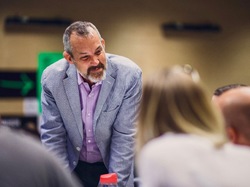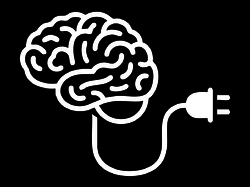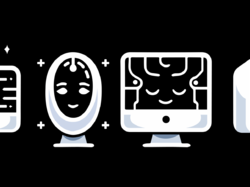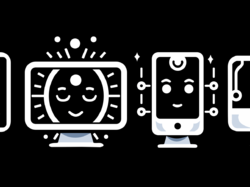I proposed a solo talk for the SXSW Interactive Festival and, wow, was also flattered to be invited to two other panel proposals on top of that. My favorite person Liza Kindred also proposed a talk on Mindful Technology, which is both timely and actionable. Help me usher these panels into the bright, bright Texas sunlight. Voting closes August 25. I’d be mighty obliged if you’d vote up these four proposals at the SXSW PanelPicker:
Josh Clark: Design in the Era of the Algorithm
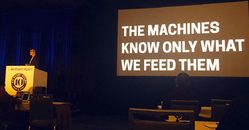
I’m super-excited to expand on the techniques and design principles I outlined earlier this year in my long-form essay about designing with machine learning. Data-driven content and interfaces are at the core of every single emerging consumer technology right now. I’ve got a crisp point of view about design’s role and responsibility in this developing future:
Designers have an urgent role to play in crafting the emerging generation of AI interfaces. This hour explores a rich set of examples—both entertaining and sobering—that unearth 10 design principles for creating responsible machine-learning applications. Learn to use AI as design material in your everyday work. Anticipate the weird, unexpected or incorrect conclusions the machines sometimes deliver. Above all, scrub data for bias to create a respectful and inclusive world we all want to live in.
Questions answered
- I’m a designer, not a data scientist. What’s my role in AI? How can I start using machine learning in my everyday work, starting today?
- How can design set better expectations and confidence in the accuracy and perspective of AI interfaces? (We’re still bad at this.)
- What are the ethical responsibilities—and actionable tasks—to root out data bias and create inclusive services? (We’re bad at this, too.)
Liza Kindred: Mindful Technology
The remarkable Liza Kindred brought down the house at this year’s Interaction conference when she debuted her framework of design principles for mindful technology. How do we bend technology to our lives instead of the reverse? What are our responsibilities as designers to help focus attention instead of trap it? Friends, I’m the luckiest person on the planet that I get to be inspired by Liza every day. You’ll do the SXSW audience a big favor by treating them to even an hour of her insights:
Staying connected does matter–but to each other, not our devices. Instead of views and attention grabs, let’s design for purpose, calm & compassion. Instead of engagement with interfaces, let’s design to engage with what we truly care about. Instead of simply building more tech, let’s build more human connection. With a host of practical examples, Liza Kindred shares a framework for how we can make and use new technologies that create real insight, joy, and utility–while still getting the job done.
Questions answered
- What is the role of mindfulness in a technology-saturated world, and how are some of the world’s biggest businesses already putting it to practical use?
- As tech settles into the most intimate spaces of our lives, homes, & bodies, what are our responsibilities for creating respectful experiences?
- What are the practical principles for & examples of creating (and using!) technologies that are respectful, calm, purposeful, & humane?
Panel: Designing Our Robot Overlords

In a few short weeks, I’m headed deep into the northern forests of Norway to huddle with a group of intimidatingly smart people to consider our alongside robots and algorithms. My friend Andy Budd of Clearleft organized this retreat and also had the good idea to share what comes of it at SXSW. I’m all atingle to join in this conversation with Andy, Amber Case (Harvard, MIT, Calm Technology), and Karen Kaushansky (futurist and hardware designer):
In the Summer of 2017 a diverse group of designers, makers, artists, academics and sci-fi authors hired the house where Ex Machina was filmed, to explore our emerging relationship with robots. What will that future really look like, and how can we use our existing design skills to make it more human?
In this session we will share the findings of this retreat, along with 8 key principals for designing better human-robot interactions.
Questions answered
- With the rise of the robots, what does the future of human-computer interaction look like?
- How can I apply my existing design skills to this new frontier?
- What new skills will I need to learn in order to thrive in this environment?
Panelists
- Andy Budd, Managing Director, Clearleft
- Josh Clark, Designer, Developer, & Author, Big Medium
- Amber Case, Research Fellow, MIT Media Lab
- Karen Kaushansky, Experience Design Leader, Independent Consultant
Panel: Killing The Design Review: Atomic Design At Scale
I spent much of last year helping the venerable internet brand About.com become Dotdash. Big Medium helped the sprawling how-to site reinvent itself as a set of six new sites, each with a new brand, and look and feel. The project was crazy successful. More than that, though, we also helped the company completely overhaul its design and development process. I was asked to moderate this proposed panel on what we did and how:
Imagine building 6 brands in one year while simultaneously changing the underlying product development process. In this session you’ll hear about Dotdash’s journey—both successes and mistakes—to embrace Atomic Design, leverage pattern libraries, and kill the design review process from 3 different perspectives: product, design, and engineering.
Questions answered
- How do you avoid meetings where the CEO tells you to scrap your prototype and start over with 2 weeks to go?
- How can you build – and maintain! – a tool that will be used by designers, developers, product, and an army of robots?
- Can you keep a whole company interested in a site buildout from start to finish?
Panelists
- Adam McClean, SVP, Product, Dotdash
- Ben Cochran, VP, Front End Development, Dotdash
- Hetal Rathod, Senior Designer, UX/UI, Dotdash
- Josh Clark, Founder, Big Medium


